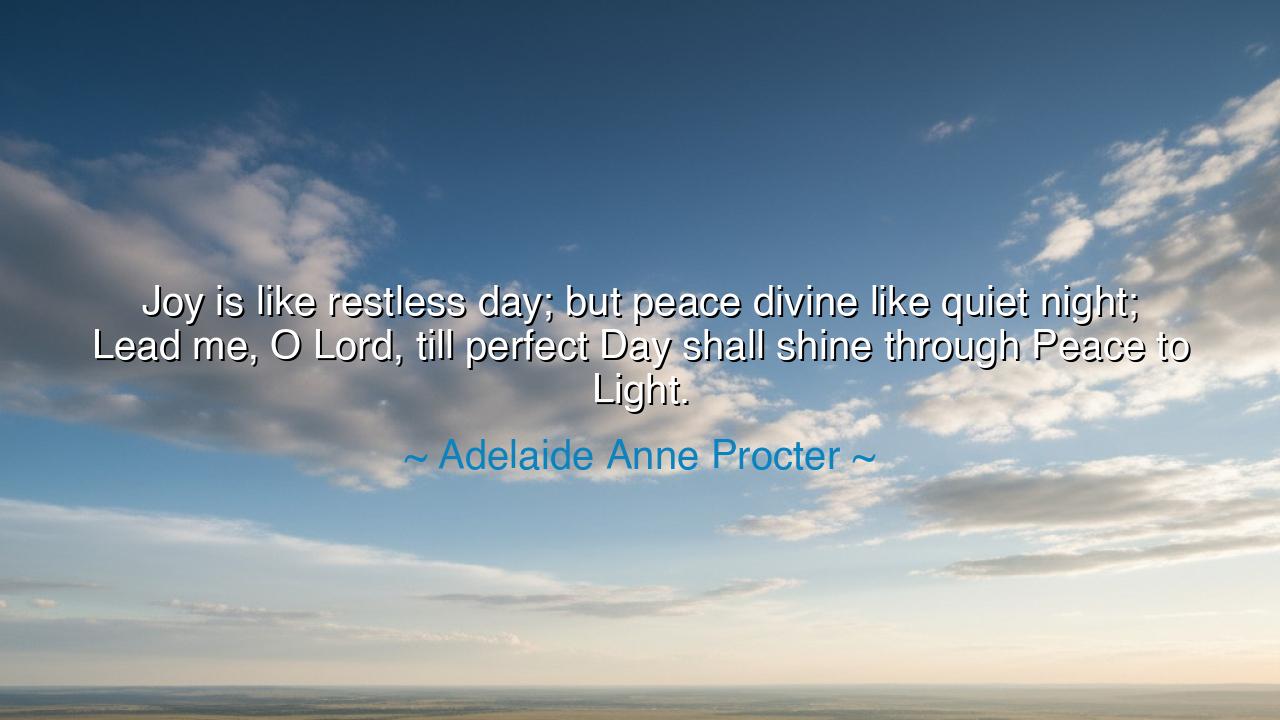
Joy is like restless day; but peace divine like quiet night;
Joy is like restless day; but peace divine like quiet night; Lead me, O Lord, till perfect Day shall shine through Peace to Light.






Hear now the tender words of Adelaide Anne Procter, poetess of the Victorian age, whose voice rose like a hymn: “Joy is like restless day; but peace divine like quiet night; Lead me, O Lord, till perfect Day shall shine through Peace to Light.” In these lines, she gathers the essence of human longing—the thirst for joy, the deeper yearning for peace, and the eternal guidance of the divine toward the fullness of light. Her words, though soft in tone, are strong in spirit, calling us to reflect upon the difference between fleeting pleasures and lasting serenity.
The meaning here unfolds like dawn. Joy, she says, is like the restless day. It is bright, dazzling, filled with motion, laughter, and delight—but it is also fleeting, unstable, subject to shadows and storms. Peace, in contrast, is like the quiet night. It may not dazzle the senses, but it soothes the soul. It brings rest, clarity, and healing. And above both, she envisions the perfect Day, a state beyond earthly contrast, where peace and light merge into divine harmony.
Her words were born in an age of turbulence. Procter lived through the anxieties of industrial transformation, the cry of the poor, and the deep spiritual questions of her century. She herself knew restlessness, for her health was frail and her life brief, yet she carried within her a heart tuned to the eternal. In her poems, she sought to reconcile human striving with divine surrender, teaching that while joy is good, only peace carries us into the presence of God.
History also shows us the truth of her words. Consider the life of Mother Teresa of Calcutta. She did not chase the restless joys of the world, nor did she bask in applause. Her life was hidden in the quiet peace of service, tending to the sick, the forgotten, the dying. And yet, through her peace, she became a beacon of light to millions. She proved that the truest happiness is not in the restless chase of pleasure, but in the stillness of love and surrender.
O children of tomorrow, learn this: joy is a blessing, but it is not the end. Like the day, it rises and sets. It thrills but cannot endure. But peace, once rooted in the soul, endures through storms, through trials, through death itself. It is the gift of the divine, a whisper of eternity. And from this peace, the soul is led toward light—that perfect day of completeness, where no shadow remains.
Reflect also on your own life. How often do you run after restless joys—the applause of others, the glitter of possessions, the thrill of achievement—only to find yourself weary and unsatisfied? Seek instead the peace that comes from within, from prayer, from forgiveness, from living in harmony with your conscience and with God. For it is in that peace that you will discover the light that does not fade.
The lesson is clear: do not despise joy, but do not mistake it for the highest good. Welcome it as the sunshine, but seek the deeper peace that comes in the night, when all is still and your soul rests in divine presence. Make time for silence, for prayer, for kindness that expects no reward. These are the practices that transform restless joy into abiding light.
So let Procter’s words guide you as a prayer for every season: “Lead me, O Lord, till perfect Day shall shine through Peace to Light.” For in the end, the restless day of joy will pass, but the quiet night of peace shall lead you into the eternal light that no darkness can overcome.






AAdministratorAdministrator
Welcome, honored guests. Please leave a comment, we will respond soon